Who The Hell is Dean Phillips?
It's quite the week for politicians with generic names nobody has ever heard of.
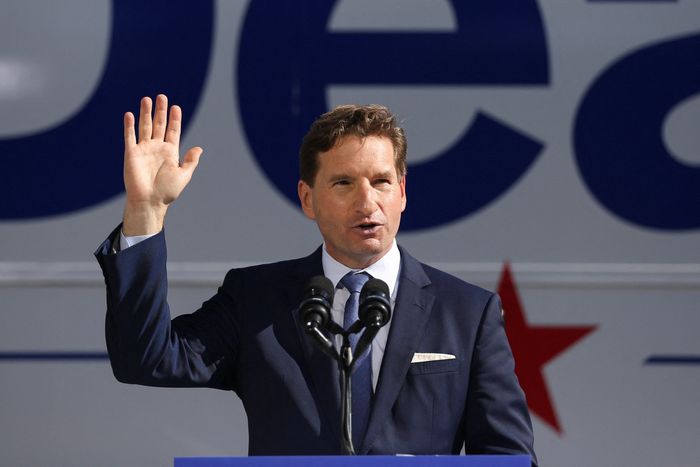
Atlantic staff writer Tim Alberta‘s “DEAN PHILLIPS HAS A WARNING FOR DEMOCRATS” is getting amplified by POLITICO Playbook and elsewhere. The wind-up is long:
To spend time around Dean Phillips, as I have since his first campaign for Congress in 2018, is to encounter someone so earnest as to be utterly suspicious. He speaks constantly of joy and beauty and inspiration, beaming at the prospect of entertaining some new perspective. He allows himself to be interrupted often—by friends, family, staffers—but rarely interrupts them, listening patiently with a politeness that almost feels aggravating. With the practiced manners of one raised with great privilege—boasting a net worth he estimates at $50 million—the gentleman from Minnesota is exactly that.
But that courtly disposition cracks, I’ve noticed, when he’s convinced that someone is lying. Maybe it’s because at six months old he lost his father in a helicopter crash that his family believes the military covered up, in a war in Vietnam that was sold to the public with tricks and subterfuge. I can hear the anger in his voice as he talks about the treachery that led to January 6, recalling his frantic search for some sort of weapon—he found only a sharpened pencil—with which to defend himself against the violent masses who were sacking the U.S. Capitol. I can see it in his eyes when Phillips, who is Jewish, remarks that some of his Democratic colleagues have recently spread falsehoods about the Israeli-Palestinian conflict, and others in the party have refused to condemn blatant anti-Semitism.
Deception is a part of politics. Phillips acknowledges that. But some deceptions are more insidious than others. On the third Saturday of October, as we sat inside the small, sun-drenched living room of his rural-Virginia farmhouse, Phillips told me he was about to do something out of character: He was going to upset some people. He was going to upset some people because he was going to run for president. And he was going to run for president, Phillips explained, because there is one deception he can no longer perpetuate.
“My grave concern,” the congressman said, “is I just don’t think President Biden will beat Donald Trump next November.”
This is a legitimate concern, indeed. Biden is far and away the oldest man to run for a second term as President, he’s historically unpopular, and he’s having trouble getting credit for the good things he’s accomplished. A year out, he’s losing in most of the swing states to a truly awful human being who is under multiple criminal indictments.
At the same time . . . Dean Phillips? An unknown Representative who has served a little over four years in the House? The’s simply no way in hell he’s going to defeat a sitting President in his party primary. For that matter, why would he be more likely to beat Trump than the guy who beat Trump last time by 8 million votes?
Anywho, Alberta finally delivers on the windup:
This isn’t some fringe viewpoint within the Democratic Party. In a year’s worth of conversations with other party leaders, Phillips told me, “everybody, without exception,” shares his fear about Joe Biden’s fragility—political and otherwise—as he seeks a second term. This might be hyperbole, but not by much: In my own recent conversations with party officials, it was hard to find anyone who wasn’t jittery about Biden. Phillips’s problem is that they refuse to say so on the record. Democrats claim to view Trump as a singular threat to the republic, the congressman complains, but for reasons of protocol and self-preservation they have been unwilling to go public with their concerns about Biden, making it all the more likely, in Phillips’s view, that the former president will return to office.
Phillips spent the past 15 months trying to head off such a calamity. He has noisily implored Biden, who turns 81 next month—and would be 86 at the end of a second term—to “pass the torch,” while openly attempting to recruit prominent young Democrats to challenge the president in 2024. He name-dropped some Democratic governors on television and made personal calls to others, urging someone, anyone, to jump into the Democratic race. What he encountered, he thought, was a dangerous dissonance: Some of the president’s allies would tell him, in private conversations, to keep agitating, to keep recruiting, that Biden had no business running in 2024—but that they weren’t in a position to do anything about it.
What made this duplicity especially maddening to Phillips, he told me, is that Democrats have seen its pernicious effects on the other side of the political aisle. For four years during Trump’s presidency, Democrats watched their Republican colleagues belittle Trump behind closed doors, then praise him to their base, creating a mirage of support that ultimately made them captives to the cult of Trumpism. Phillips stresses that there is no equivalence between Trump and Biden. Still, having been elected in 2018 alongside a class of idealistic young Democrats—“the Watergate babies of the Trump era,” Phillips said—he always took great encouragement in the belief that his party would never fall into the trap of elevating people over principles.
“We don’t have time to make this about any one individual. This is about a mission to stop Donald Trump,” Phillips, who is 54, told me. “I’m just so frustrated—I’m growing appalled—by the silence from people whose job it is to be loud.”
I don’t think Phillips helps himself by conflating Democrats biting their tongue over their belief that their inevitable nominee is geriatric and Republicans doing the same over their nominee being a dangerous authoritarian. At the same time, he’s not wrong: if a preponderance of Democratic Members of Congress legitimately think Biden is too frail to beat Trump, much less serve another five years, they really do have a duty to do something about that.
Phillips tried to make peace with this. As recently as eight weeks ago, he had quietly resigned himself to Biden’s nomination. The difference now, he said—the reason for his own buzzer-beating run for the presidency—is that Biden’s numbers have gone from bad to awful. Surveys taken since late summer show the president’s approval ratings hovering at or below 40 percent, Trump pulling ahead in the horse race, and sizable majorities of voters, including Democratic voters, wishing the president would step aside. These findings are apparent in district-level survey data collected by Phillips’s colleagues in the House, and have been the source of frenzied intraparty discussion since the August recess. And yet Democrats’ reaction to them, Phillips said, has been to grimace, shrug, and say it’s too late for anything to be done.
“There’s no such thing as too late,” Phillips told me, “until Donald Trump is in the White House again.”
Biden’s age and diminished verbal abilities worry me as well. Kamala Harris—who was chosen as running mate because Candidate Biden made a promise to choose a woman, which then became a Woman of Color in the wake of the Black Lives Matter protests—is not anybody’s choice for commander-in-chief. Yet, objectively, he’s been an effective President.
I’m in the Democratic coalition reluctantly, forced to vote for their candidates because the opposition party has gone off the rails. I opposed, at least in magnitude, many of Biden’s signature initiatives. Yet he’s been as steady as we could reasonably have hoped for on the big crises, especially Ukraine and the Israel-Gaza war. Would I rather have, say, Gavin Newsom in the big chair right now? No, I would not.
And, more to the point, I sure as hell wouldn’t want Dean, an earnest neophyte whose claim to fame is running a gelato company, getting the proverbial 3 am call. On principle, I’d prefer a man in his mid-50s to one in his early 80s. But, even if we could just fiat him the Democratic nomination, there’s just no evidence he’s ready to take on Trump, much less the burdens of global leadership.
In recent weeks, Phillips has reached out to a wide assortment of party elders. He did this, in part, as a check on his own sanity. He was becoming panicked at the prospect of Trump’s probable return to office. He halfway hoped to be told that he was losing his grip on reality, that Trump Derangement Syndrome had gotten to him. He wanted someone to tell him that everything was going to be fine. Instead, in phone call after phone call, his fears were only exacerbated.
“I’m looking at polling data, and I’m looking at all of it. The president’s numbers are just not good—and they’re not getting any better,” James Carville, the Democratic strategist, told me, summarizing his recent conversations with Phillips. “I talk to a lot of people who do a lot of congressional-level polling and state polling, and they’re all saying the same thing. There’s not an outlier; there’s not another opinion … The question is, has the country made up its mind?”
While I respect Carville’s savvy and enjoy his irascible nature, it’s just silly to look at polling this far out and say the cake is baked. Trump’s margins are tiny and the campaign hasn’t even started yet. And that’s to say nothing of the four criminal trials breathing down his neck.
Jim Messina, who ran Barack Obama’s 2012 campaign, told me the answer is no. “This is exactly where we were at this stage of that election cycle,” Messina said. He pointed to the November 6, 2011, issue of The New York Times Magazine, the cover of which read, “So, Is Obama Toast?” Messina called the current situation just another case of bedwetting. “If there was real concern, then you’d have real politicians running,” he said. “I’d never heard of Dean Phillips until a few weeks ago.”
The bottom line, Messina said, is that “Biden’s already beaten Trump once. He’s the one guy who can beat him again.”
In fairness, the cover in question was the print version of clickbait. The story itself, by Nate Silver, was pretty wishy-washy, simply noting that Obama was unusually vulnerable for an incumbent but that it was way too early to make reliable forecasts and the election was probably a toss-up.
Carville struggles with this logic. The White House, he said, “operates with what I call this doctrine of strategic certainty,” arguing that Biden is on the same slow-but-steady trajectory he followed in 2020. “Joe Biden has been counted out by the Beltway insiders, pundits, DC media, and anonymous Washington sources time and time again,” the Biden campaign wrote in a statement. “Time and time again, they have been wrong.” The problem is that 2024 bears little resemblance to 2020: Biden is even older, there is a proliferation of third-party and independent candidates, and the Democratic base, which turned out in record numbers in the last presidential election, appears deflated. (“The most under-covered story in contemporary American politics,” Carville said, “is that Black turnout has been miserable everywhere since 2020.”) Carville added that in his own discussions with leading Democrats, when he argues that Biden’s prospects for reelection have grown bleak, “Nobody is saying, ‘James, you’re wrong,’” he told me. “They’re saying, ‘James, you can’t say that.’”
Hence his fondness for Phillips. “Remember when the Roman Catholic Church convicted Galileo of heresy for saying that the Earth moves around the sun? He said, ‘And yet, it still moves,’” Carville told me, cackling in his Cajun drawl. The truth is, Carville said, Biden’s numbers aren’t moving—and whoever points that out is bound to be treated like a heretic in Democratic circles.
It’s the nature of party elites—and, indeed, those of us who pay attention to politics on a daily basis rather than just tuning in for the playoffs—to obsess about way-too-early polls and every twist and turn of the news cycle. Assuming he’s healthy and not a convicted criminal, I would give Trump roughly 40-45% chance of winning a head-to-head contest with Biden. That’s scary high odds given how dangerous he is but I’d frankly give any major party nominee similar odds this far out. It’s the nature of a binary choice.
That Biden’s numbers are stuck worry me. But a lot of that is simply the increasingly petrified nature of the competition: the ceiling for a President is just much lower than it used to be.
Here’s the RealClearPolitics approval trend for Biden going back to the first post-inauguration polls:
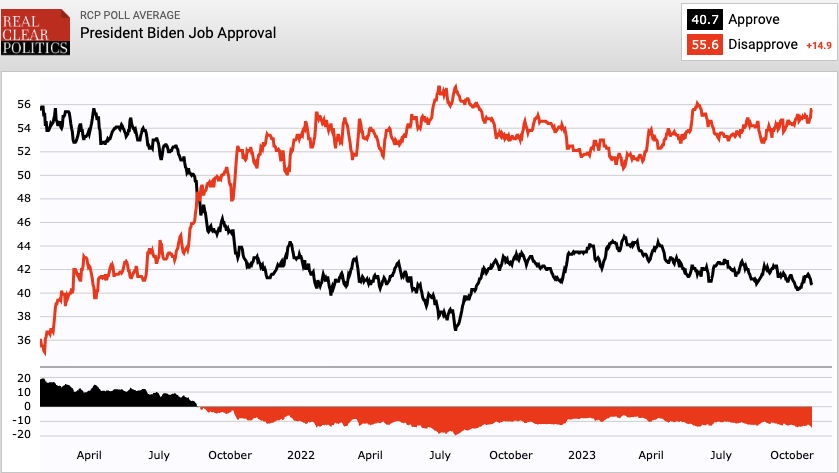
Here are Trump’s:
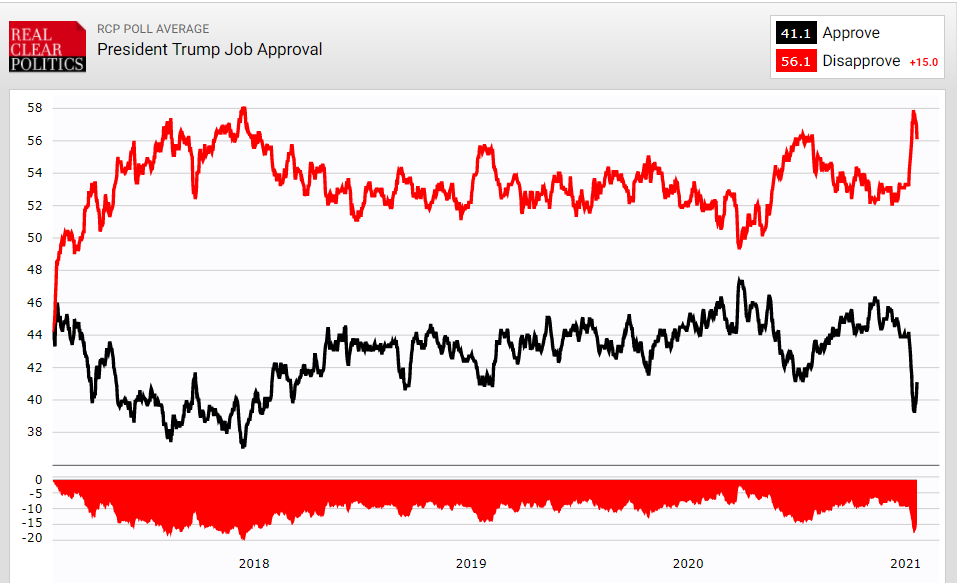
Trump spent essentially his entire presidency underwater, never crossing over the 50% approval line. Biden stayed above that mark the first seven months of his presidency but has been underwater since.
Compare this to Barack Obama:
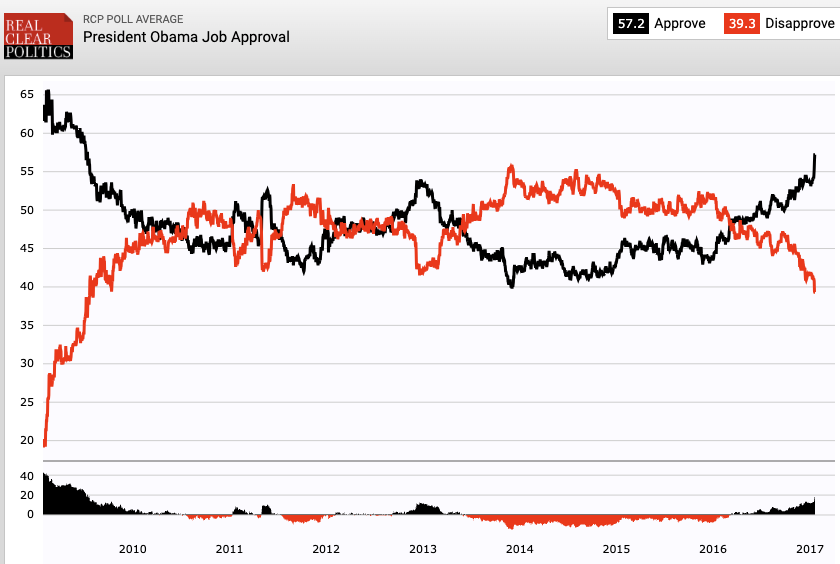
Or George W. Bush:
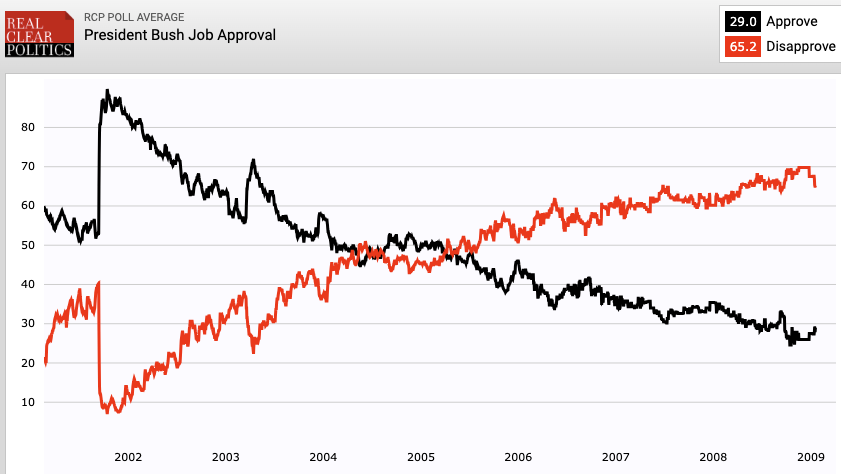
Both experienced periods of great highs as well as periods underwater. Obama never got under 40 percent approval. Bush obviously got a huge bounce in the aftermath of the 9/11 attacks but note that he was at 60 percent when he took the oath, despite a bitterly contested recount fight and resentment from Democrats that the election had been stolen. A variety of calamities—the Iraq War, Katrina, the Great Recession—ultimately tanked his ratings. But that was mostly a function of actual public sentiment about the direction of the country rather than hyperpartisanship.
Which is all a longwinded way of saying that I’m not sure that we can learn much about the 2024 contest from the 2012 contest or any that went before. We’re simply in a radically different political and information climate in which there are far fewer persuadables.
Regardless, Phillips has to know his bid is Quixotic, however motivated he may be by righteous outrage over his colleagues not saying the quiet part out loud.
Phillips knows that he’s making a permanent enemy of the party establishment. He realizes that he’s likely throwing away a promising career in Congress; already, a Democratic National Committee member from Minnesota has announced a primary challenge and enlisted the help of leading firms in the St. Paul area to take Phillips out. He told me how, after the news of his impending launch leaked to the press, “a colleague from New Hampshire”—the congressman grinned, as that description narrowed it down to just two people—told him that his candidacy was “not serious” and “offensive” to the state’s voters. In the run-up to his launch, Phillips tried to speak with the president—to convey his respect before entering the race. On Thursday night, he said, the White House got back to him: Biden would not be talking to Phillips.
For one thing, Biden is rather busy at the moment with multiple crises. But, yeah, he’s not going to clear his schedule for a backbencher who’s stabbing him in the back.
Ironically:
Cedric Richmond, the onetime Louisiana congressman who is now co-chair of Biden’s reelection campaign, told me Phillips doesn’t “give a crap” about the party and is pursuing “a vanity project” that could result in another Trump presidency. “History tells us when the sitting president faces a primary challenge, it weakens him for the general election,” Richmond said. “No party has ever survived that.”
But I’m not sure Phillips really counts. There hasn’t been a legitimate primary challenger since, what, Pat Buchanan in 1992? Before that, Teddy Kennedy in 1980, Ronald Reagan in 1976, and Eugene McCarthy and Bobby Kennedy in 1968. But those candidates were all established stars within their party. Phillips seems earnest enough but he’s a non-entitity.
But Phillips insists—and his friends, even those who think he’s making a crushing mistake, attest—that he is doing this out of genuine conviction. Standing up and leaning across a coffee table inside his living room, Phillips pulled out his phone and recited data from recent surveys. One showed 70 percent of Democrats under 35 wanting a different nominee; another showed swing-state voters siding with Trump over Biden on a majority of policy issues, and independents roundly rejecting “Bidenomics,” the White House branding for the president’s handling of the economy. “These are not numbers that you can massage,” Phillips said. “Look, just because he’s old, that’s not a disqualifier. But being old, in decline, and having numbers that are clearly moving in the wrong direction? It’s getting to red-alert kind of stuff.”
Phillips sat back down. “Someone had to do this,” the congressman told me. “It just was so self-evident.”
The Politician’s Syllogism, attributed to a 1988 episode of Yes, Prime Minister, goes: “We must do something. This is something. Therefore, we must do this.” Despite its humorous origins, Phillips is very much falling into it. Yes, Democrats want someone other than Biden as their nominee. Alas, while Phillips is indeed someone other than Biden, they don’t mean Phillips.
Phillips no longer wonders whether there’s something wrong with him. He believes there’s something wrong with the Democratic Party—a “disease” that discourages competition and shuts down dialogue and crushes dissent. Phillips said his campaign for president won’t simply be about the “generational schism” that pits clinging-to-power Baby Boomers against the rest of the country. If he’s running, the congressman said, he’s running on all the schisms that divide the Democrats: cultural and ideological, economic and geographic. He intends to tell some “hard truths” about a party that, in its attempt to turn the page on Trump, he argued, has done things to help move him back into the Oval Office. He sounded at times less like a man who wants to win the presidency, and more like someone who wants to draw attention to the decaying state of our body politic.
I mean, God bless him. But I’m pretty sure most people who are going to pay even the slightest attention to a Quixotic primary campaign are already painfully aware.
Over the course of a weekend on Phillips’s farm, we spent hours discussing the twisted incentive structures of America’s governing institutions. He talked about loyalties and blind spots, about how truth takes a back seat to narrative, about how we tell ourselves stories to ignore uncomfortable realities. Time and again, I pressed Phillips on the most uncomfortable reality of all: By running against Biden—by litigating the president’s age and fitness for office in months of town-hall meetings across New Hampshire—isn’t he likely to make a weak incumbent that much weaker, thereby making another Trump presidency all the more likely?
“I want to strengthen him. If it’s not me, I want to strengthen him. I won’t quit until I strengthen him. I mean it,” Phillips said of Biden. “I do not intend to undermine him, demean him, diminish him, attack him, or embarrass him.”
While I suspect he’s sincere, this is just bat shit crazy. That’s just not how any of this works.
Phillips’s friends tell me his intentions are pure. But they fear that what makes him special—his guileless, romantic approach to politics—could in this case be ruinous for the country. They have warned him about the primary campaigns against George H. W. Bush in 1992 and Jimmy Carter in 1980, both of whom lost in the general election.
In fairness, a calamitous economy was at play in both instances. In Bush’s case, a late-breaking scandal didn’t help. In Carter’s, the Iran Hostage Crisis, the one-year anniversary of which coincided with Election Day, surely contributed more than a challenger. And both faced general election opponents who were generational talents.
Phillips insisted to me that he wouldn’t be running against Biden. Rather, he would be campaigning for the future of the Democratic Party. There was no scenario, he said, in which his candidacy would result in Trump winning back the White House.
While I don’t think he’ll be much of a factor, the idea that pointing out that Old Man Biden is getting in the way of the future would somehow not play into Trump’s hands baffles me. It might not matter. But it sure as hell isn’t going to help.
And, while guilelessness might be a refreshing quality in a politician, it’s not an especially helpful one in someone who wants to lead his party:
And in that moment, it was Dean Phillips who was telling himself a story.
He didn’t see the question coming—but he didn’t try to duck it, either.
It was July of last year. Phillips was doing a regular spot on WCCO radio, a news-talk station in his district, when host Chad Hartman asked the congressman if he wanted Biden to run for reelection in 2024. “No. I don’t,” Phillips replied, while making sure to voice his admiration for the president. “I think the country would be well served by a new generation of compelling, well-prepared, dynamic Democrats to step up.”
Phillips didn’t think much about the comment. After all, he’d run for Congress in 2018 promising not to vote for Nancy Pelosi as speaker of the House (though he ultimately did support her as part of a deal that codified the end of her time in leadership). While he has been a reliable vote in the Democratic caucus—almost always siding with Biden on the House floor—Phillips has simultaneously been a squeaky wheel. He’s a centrist unhappy with what he sees as the party’s coddling of the far left. He’s a Gen Xer convinced that the party’s aging leadership is out of step with the country. He’s an industrialist worried about the party’s hostility toward Big Business. (When he was 3 years old, his mother married the heir of a distilling empire; Phillips took it over in his early 30s, then made his own fortune with the gelato company Talenti.)
When the blowback to the radio interview arrived—party donors, activists, and officials in both Minnesota and Washington rebuked him as disloyal—Phillips was puzzled. Hadn’t Biden himself said, while campaigning in 2020, that he would be a “bridge” to the future of the Democratic Party? Hadn’t he made that remark flanked by Michigan Governor Gretchen Whitmer on one side and future Vice President Kamala Harris on the other? Hadn’t he all but promised that his campaign was about removing Trump from power, not staying in power himself?
Phillips had never seriously entertained the notion that Biden would seek reelection. Neither had many of his Democratic colleagues. In fact, several House Democrats told me—on the condition of anonymity, as not one of them would speak on the record for this article—that in their conversations with Biden’s inner circle throughout the summer and fall of 2022, the question was never if the president would announce his decision to forgo a second term, but when he would make that announcement.
The idea that Biden would run as a one-term caretaker was always a silly fantasy. First off, the second he let on that this was the case, he would transform into a lame duck while everyone around him positioned themselves for the race to succeed him. Second, nobody who has the office wants to give it up. Third, Biden almost surely thinks he is the man best prepared to lead the country at this juncture.
That professional politicians actually thought otherwise is simply baffling.
Figuring that he’d dealt with the worst of the recoil—and still very much certain that Biden would ultimately step aside—Phillips grew more vocal. He spent the balance of 2022, while campaigning for his own reelection, arguing that both Biden and Pelosi should make way for younger Democratic leaders to emerge. He was relieved when, after Republicans recaptured the House of Representatives that fall, Pelosi allowed Hakeem Jeffries, a friend of Phillips’s, to succeed her atop the caucus.
But that relief soon gave way to worry: As the calendar turned to 2023, there were rumblings coming from the other end of Pennsylvania Avenue that Biden might run for reelection after all. In February, Phillips irked his colleagues on Capitol Hill when he gave an extensive interview to the Politico columnist Jonathan Martin shaming Democrats for suppressing their concerns about Biden. At that point, his friends in the caucus still believed that Phillips was picking a fight for no reason. When Biden announced his candidacy two months later, several people recalled to me, some congressional Democrats were stunned.
“Many actually felt, I think, personally offended,” Phillips said. “They felt he had made a promise—either implicitly, if not explicitly.”
He was signalling implicitly, if not explicitly, from Day 1 that he was running for a second term if his health permitted it.
There’s actually a whole lot more to the article but you get the point.

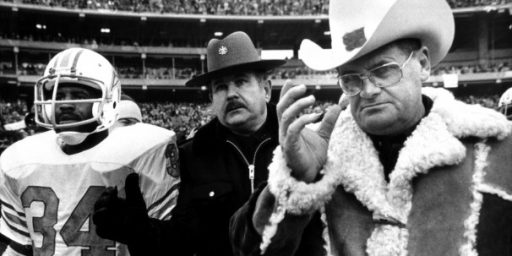




This is just such a great example of the frequent simplistic nature of American political analysis (the idea that a president who has a primary challenger is always wounded). First, the N is so small as be very unhelpful. Second, and more importantly, as James eludes, each of those challengers represented a faction of their parties who were discontent or wanted change. So the issue was not primary challengers (actually, I think every president has had a challenger of some kind, probably multiple ones, but we ignore them because they have no support).
Carter didn’t suffer in 1980 because Kennedy challenged him for the nomination. The fact that Kennedy challenged him was a symptom of Carter’s weak position.
If Dean Phillips in on the ballot he won’t matter. Full stop.
Two other observations:
1. I agree with James and have made the point myself in a similar fashion by looking at historical graphs, that the predictive nature of approval ratings is just not what it used to be. I think that there is a relatively fixed range.
2. I will be contrarian about Carville, I think his schtick ran out (for me at least) a long time ago and he has ridden on that 92 win and “It’s the Economy, Stupid” for a very long time.
Oh look another business guy who’s pretty sure he’s got it figured out! Nothing personal, but Phillips has the air of “everybody says I’m right and it’s definitely not because I’m rich” about him.
I understand the desire not to run Biden again. I didn’t want him to run. But I also didn’t think Trump would have anything left this long after his disgraceful exit.
Realistically, Biden is the best candidate the Democrats have right now. Experience isn’t a question – it would be with any other candidate – and he’s weathered all the BS the Republicans and Trump have tried to throw at him. You don’t toss new chum in the water if you can avoid it.
And it’s likely that Trump is cooked after this round. Bring the right hook that’s been successful through the whole bout, don’t cross your fingers that there’s some new King Hippo-ass combo you haven’t tried that will absolutely wreck him.
Yup, “we must do something and this is something…” about sums it up. Given that on the Dem side the Iowa caucuses are all but dead, while Biden’s name will not appear on the ballot for the NH Dem primary, as the date will not conform to the parties demands, there is a small chance that Phillips, could win the NH beauty contest.
Digby quotes a Daily Beast (paywalled) article that presents a more credible picture of Phillips as a “richie-rich narcissist”. His campaign is being run by Steve Schmidt, McCain strategist and something of an attention whore himself. There’s some speculation that, like No Labels, this is a GOP funded effort to weaken Biden. (Which Phillips may be dumb enough to not realize).
WIKI says after his father’s death in Vietnam Nam his mother remarried, to the heir of Phillips Distilling Company. I would guess that if she moved in that social circle she also had money. Dean got an MBA and immediately became president and CEO of the family company. He stepped aside to run Talenti, which he bought, not founded, and later sold to Unilever. The, admittedly brief, WIKI page on Talenti doesn’t mention his period of ownership. (Good news, as I like Talenti gelato. My workshop shelves are lined with hardware filled Talenti jars. I’d hate to give my money to this flake.)
He now runs the Penny’s Coffee conglomerate (two shops in the Cities). He’s voted with Biden 100%.
@gVOR10:
I also like Talenti and I’m down for a political future featuring competing snack moguls. I’m not sure where Mrs. Fields stands on the issues, but she makes a good cookie.
Every cycle we get at least one of these randos suffering from an overinflated ego.
I’m not a political scientist, of course. But I feel that the cultural and technological world we live in today is so different from just ten years ago, never mind 50 years ago, that it’s difficult to draw conclusions from the past. Facebook and twitter are really only 15 years old or so. Fox News is not even 30 years old. The audiences of those and other services have been so propagandized and sorted by now that I can’t imagine another president ever getting 80% approval. Maybe not even 50%. I hope I’m wrong.
Phillips inherited a ton of money from his daddy, and as we know from Trump that qualifies you to be president.
The real question for me is whether Tim Alberta is a complete moron or just a total whore.
And how much you have to pay The Atlantic to get them to jettison all journalistic credibility like this.
@wr: I think the big problem is that The Atlantic has a daily newsletter to send out with a daily array of all new material. How many of us can write 10000 words of intelligent new material every day?
I doubt very much the goal is to actually beat Biden. It’s to get his name out there, and if Biden loses to Trump, he can say “I told you so.” His quest is Quixotic only in terms of the short-game. Phillips is likely succeeding in what he wants to do – get on the radar and have people talking about him.
This interminable discussion has become tiresome. Democrats accepted that Joe was going to be the 2024 nominee when they picked him three years ago. Electing a president who announced halfway through his first term that he was not running again would have been stupid under any circumstances, but doing it after a primary when two of the top three other candidates had been even older than Biden, and the other one a sprightly 73, would have been staggeringly idiotic.
It would have been the lamest of lame duck presidencies. The primary would have given Kamala Harris the choice of defending Biden, or criticising him. The latter would of course have been disastrous, but the former would have forced other candidates to criticise him – candidates who had been his cabinet members or supporters in Congress. It would have been a shambles, doubly so if Bernie Sanders decided to have one last shot at the prize. Meanwhile Trump would have been cruising effortlessly to the Republican nomination, unable to believe the target-rich territory on the other side.
If Joe didn’t want to run again, he should have resigned after the mid-terms to allow Kamala Harris to establish her own record to run on. He didn’t, so the party is stuck with him for better or worse. Endless chin-stroking about some hypothetical alternative candidate is pointless and destructive.